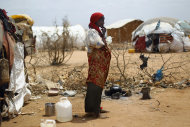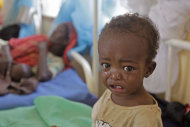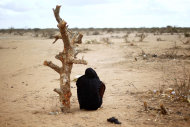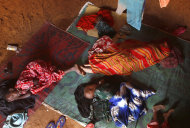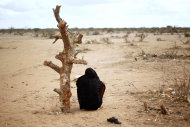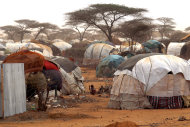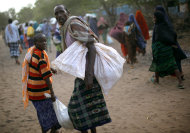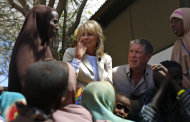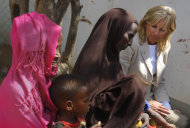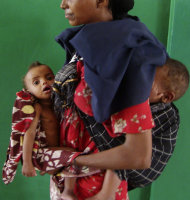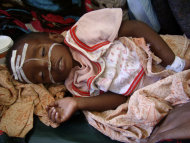DHOBLEY, Somalia (AP) — Somalis with new uniforms and guns, reportedly purchased by Kenya's government, are supposed to be guarding the Kenya-Somalia border against Islamist insurgents. But some are selling their weapons and are even preying on Somalis fleeing their famine-stricken country.
This new breed of gunman and the proliferation of weapons is making the trek from Somalia's parched landscape even more dangerous for thousands of defenseless refugees. They endure days- and weeks-long walks to refugee camps and their promise of food, but many starve along the way. Some parents arrive carrying children so malnourished they look like tiny aliens, swollen heads lolling on stick-thin necks. Others arrive with empty arms, having left dead sons and daughters on the road behind them.
Kenyan police arrested three deserters from the guard force on Saturday for trying to sell their weapons in this destitute and desperate region, said Nelson Tatliti, the deputy officer in charge of the police station in at Dadaab, Kenya, site of sprawling refugee camps.
"These are the ones causing problems on the border," Tatliti said.
Aid groups operating around Dadaab say many refugees have been attacked by gunmen, some of whom may have come from the so-called Jubaland militia.
"There are some people from Jubaland who joined up and then ran away. They come to the refugee areas and disturb them," said Sabik Shakuku, a Kenyan who does conflict resolution in the area and receives funding from the Pan African Center for Peace and Conflict Resolution. "We have told the government but they have not taken action."
A Kenyan government spokesman did not return calls seeking comment. Kenya has long asserted that the presence of al-Shabab, an Islamist militant group that controls huge swaths of Somalia, near its border is a big security threat. The south of Somalia — the part of the Horn of Africa nation that is closest to Kenya — is mostly held by al-Shabab. Aid agencies can't access much of Somalia because the al-Qaida-linked Islamist rebel group has banned most aid agencies.
Hussein Mohamed, a commander with the Jubaland force, said Kenya "gives us a lot of help because we are fighting al-Shabab."
Mohamed — who was traveling on a recent day in a convoy of Kenyan government vehicles, his own car flying a blue and white Somali flag — acknowledged that many members of the militia have no salaries.
"About 60 percent of us get paid," said Mohamed, pointing out shoes, vehicles, uniforms and weapons that were gifts from Kenya. He was clad in a brand-new olive green uniform.
"The rest must share, or go without," he added.
The loose oversight of the Jubaland guard force, and of their weapons, creates an additional hazard for Somalis fleeing hunger and violence.
Among the latest victims was a 13-year-old girl who fled Somalia with her parents and two sisters. After the family crossed the Kenyan border, gunmen stopped their donkey cart, robbed the parents and kidnapped the sisters. It is not clear if their attackers were militiamen or possibly bandits who had bought their guns.
The three girls were gang-raped next to each other for two days before being released, the girl told The Associated Press as she buried her face in her shawl.
Many countries have tried to fund forces in Somalia's long conflict only to find their trainees deserting and their equipment in the marketplace after promised wages did not arrive. Similar problems dogged an European Union-funded program to train Somali police, French-backed training for Somali soldiers in Djibouti and U.S. and Italian attempts to pay Somali soldiers.
Now the Italians and the United States insist on paying each individual Somali soldier $100 in person every month rather than giving money to commanders.
Often, members of the force backed by Kenya do not know who is paying them, how much or how often. Both soldiers in the force and men who deserted from it said wages were irregular and there seemed to be little tracking of weapons or ammunition.
"Sometimes we get paid and sometimes not," said Said Dahir, a 23-year-old militia member. "We only get rice for food, so sometimes we got to the refugee camps (to eat) and come back."
Six deserters interviewed by AP said they had left because they did not receive promised wages and food was scarce. The commanders kept most of the money and only paid the men from their clan, the deserters said. The AP withheld their last names to protect them from retribution
The deserters, interviewed on condition their surnames be withheld to protect them from retribution, said rifles were changing hands for less than $100, a dramatic fall from the price of $230 six months ago. Some deserters they knew were carrying out attacks on refugees, they said. Other attacks were done by bandits who bought their weapons, they said.
Ali, who said he deserted after two months, described seeing a commander going around trying to compile a list of men who had deserted with their guns. The list was very long, he said. But most men who deserted were not thieves, he said. They just wanted some food and their guns were their only possession of value.
Abdi, a tall, thin 25-year-old deserter with a dark bruise on his forehead from constant prayer, said he had received no money and little food when he belonged to the guard force.
It had taken him 10 days to find someone to buy his gun because the market was so flooded with weapons. After he sold it, he used half the money to buy a bus ticket to a refugee camp.
Gunmen who stopped the bus he was on robbed him of the rest, he said.
The U.N. says tens of thousands of people have already died in the Horn of Africa drought and that more than 12 million people in the region need food aid.
___

